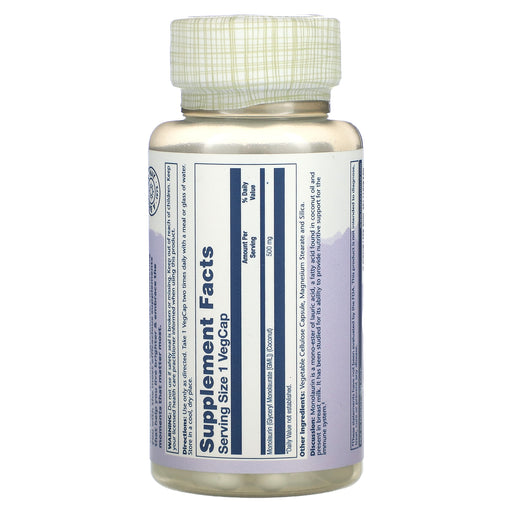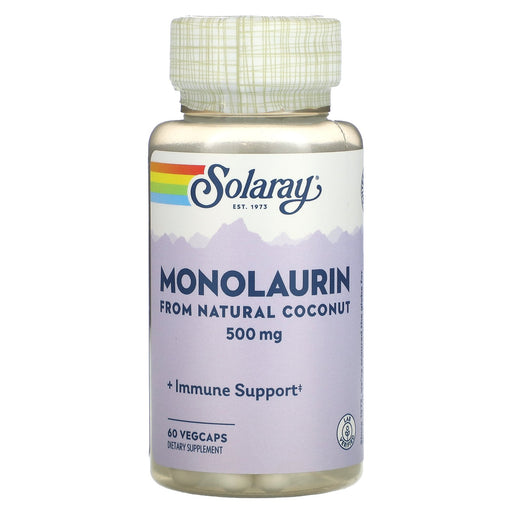
The Natural Immune-Boosting Powerhouse for Optimal Health and Well-Being
Monolaurin, a natural compound derived from coconut oil, has gained significant attention in recent years for its powerful immune-supportive and antimicrobial properties. As a lauric acid derivative, monolaurin has been shown to help bolster the body's natural defenses against a wide range of pathogens, including viruses, bacteria, and fungi. By incorporating monolaurin supplements into your wellness routine, you can harness the immune-boosting potential of this remarkable natural compound, supporting your body's innate resilience and promoting overall health and well-being.
The Science Behind Monolaurin's Immune-Supportive Properties
Monolaurin's impressive immune-boosting benefits can be attributed to its unique chemical structure and ability to interact with the lipid membranes of various pathogens. The key mechanisms behind monolaurin's immune-supportive properties include:
- Viral Envelope Disruption: Monolaurin has been shown to disrupt the lipid envelope of many viruses, effectively inactivating them and reducing their ability to infect host cells.
- Bacterial Membrane Interference: By interfering with the integrity of bacterial cell membranes, monolaurin can help to inhibit the growth and proliferation of harmful bacteria, supporting the body's natural defenses against infection.
- Fungal Growth Inhibition: Monolaurin has demonstrated antifungal properties, helping to inhibit the growth of various fungal species and maintain a healthy balance of microorganisms within the body.
- Immune System Modulation: Some studies suggest that monolaurin may help to modulate the immune system, enhancing the activity of immune cells and supporting the body's natural response to pathogens.
The Potential Health Benefits of Monolaurin Supplementation
The immune-supportive and antimicrobial properties of monolaurin have been linked to a wide range of potential health benefits, supporting not only immune function but also overall well-being. Some of the key benefits of monolaurin supplementation include:
- Enhanced Immune Defense: By supporting the body's natural defenses against viruses, bacteria, and fungi, monolaurin can help to promote a more robust and resilient immune system, reducing the risk of illness and infection.
- Digestive Health Support: Monolaurin's antimicrobial properties may help to maintain a healthy balance of gut microorganisms, supporting digestive function and reducing the risk of gastrointestinal issues.
- Skin Health Promotion: The antibacterial and antifungal properties of monolaurin may help to support healthy skin by reducing the overgrowth of harmful microorganisms that can contribute to various skin conditions.
- Respiratory Health Support: Some studies suggest that monolaurin may help to support respiratory health by reducing the risk of viral and bacterial infections that can affect the respiratory tract.
- Overall Well-Being: By supporting immune function and promoting a healthy balance of microorganisms within the body, monolaurin can contribute to a greater sense of overall health and well-being.
Choosing the Right Monolaurin Supplement
When selecting a monolaurin supplement, it's essential to choose a high-quality product from a reputable brand that guarantees purity, potency, and safety. Some key factors to consider include:
- Purity and Source: Look for monolaurin supplements that are derived from high-quality, pure coconut oil and are free from contaminants, fillers, and artificial additives.
- Potency and Dosage: Choose supplements that provide a clinically effective dose of monolaurin, typically ranging from 1,000 to 3,000 mg per day, depending on individual needs and health goals.
- Manufacturing Standards: Opt for supplements that are manufactured in GMP-certified facilities, ensuring strict adherence to quality control standards and best practices.
- Brand Reputation: Select monolaurin supplements from trusted brands with a proven track record of producing high-quality, science-backed products that prioritize safety and efficacy.
It's important to note that while monolaurin is generally considered safe for most individuals, it's always best to consult with a healthcare professional before starting any new supplement regimen, especially if you have a pre-existing health condition or are taking medications.
Related Vitamins and Supplements
While monolaurin is a powerful immune-supportive compound on its own, certain vitamins and supplements can complement its benefits and further support immune health and overall well-being. Some relevant options to consider alongside monolaurin include:
- Vitamin C: This potent antioxidant vitamin supports immune function, collagen synthesis, and overall cellular health, making it an excellent companion to monolaurin for comprehensive immune support.
- Vitamin D: This essential vitamin plays a critical role in regulating immune function, and adequate levels are necessary for optimal immune health and overall well-being.
- Zinc: This mineral is crucial for immune cell development and function, and deficiencies have been linked to impaired immune response and increased susceptibility to infections.
- Probiotics: These beneficial bacteria support digestive health, immune function, and overall well-being, working synergistically with monolaurin to promote a healthy balance of microorganisms within the body.
Experience the Immune-Boosting Power of Monolaurin
At Health Orchard, we are dedicated to providing our customers with the highest quality monolaurin supplements to support immune health, microbial balance, and overall well-being. Our carefully curated selection features monolaurin products from trusted brands, formulated with pure, potent ingredients for optimal efficacy and safety.
Whether you're looking to bolster your body's natural defenses, support digestive health, promote healthy skin, or simply enhance your overall sense of well-being, our monolaurin supplement collection has the perfect product to meet your unique needs and goals.
Witness the natural immune-boosting potential of monolaurin and experience the difference it can make in your journey towards optimal health and vitality. Browse our selection today and take the first step towards harnessing the power of this remarkable natural compound for your immune health and overall well-being.
Frequently Asked Questions about Monolaurin
1. What is monolaurin supplement used for?
Monolaurin supplements are derived from coconut oil and are used to support immune function, thanks to their antiviral, antimicrobial, and antifungal properties. Monolaurin may help protect against various infections, including those caused by bacteria, viruses, and fungi. Some people also use monolaurin to promote digestive health and maintain a healthy balance of gut bacteria. However, more research is needed to confirm the effectiveness of monolaurin supplements for specific health conditions.
2. Can monolaurin be taken daily?
Yes, monolaurin can generally be taken daily, as it is considered safe for most people when consumed in recommended doses. However, it is essential to follow the dosage instructions provided by the manufacturer or consult with a healthcare professional to determine the appropriate daily intake for your individual needs. Some people may experience mild side effects, such as digestive discomfort, when starting to take monolaurin supplements, but these usually subside with continued use.
3. What is the best source of monolaurin?
The best source of monolaurin is coconut oil, as it naturally contains high levels of lauric acid, which the body converts into monolaurin. Other sources of lauric acid include palm kernel oil and breast milk. For those seeking a more concentrated form of monolaurin, supplements are available in capsule, tablet, or powder form. When choosing a monolaurin supplement, look for products from reputable brands that use high-quality, pure ingredients and adhere to good manufacturing practices to ensure potency and safety.
4. Does monolaurin affect the liver?
There is limited research on the direct effects of monolaurin on liver function. However, some studies suggest that monolaurin may have potential benefits for liver health. For example, monolaurin has been shown to have anti-inflammatory and antioxidant properties, which may help protect the liver from damage caused by oxidative stress and inflammation. Additionally, monolaurin's antimicrobial properties may help support liver health by promoting a healthy balance of gut bacteria and reducing the risk of infections that can impact liver function.
5. Can you take monolaurin on an empty stomach?
Yes, monolaurin can be taken on an empty stomach. In fact, taking monolaurin on an empty stomach may enhance its absorption and effectiveness. However, some people may experience mild digestive discomfort when taking monolaurin on an empty stomach, particularly when first starting to use the supplement. If this occurs, try taking monolaurin with a small amount of food to reduce potential side effects. As with any supplement, it is essential to follow the dosage instructions provided by the manufacturer or consult with a healthcare professional for personalized guidance.
6. What foods are high in monolaurin?
Foods that are high in monolaurin include coconut oil, coconut milk, and coconut cream, as they naturally contain high levels of lauric acid, which the body converts into monolaurin. Other foods that contain lauric acid, but in lower amounts, include palm kernel oil and human breast milk. It is important to note that while these foods contain lauric acid, the actual monolaurin content may vary depending on factors such as processing methods and individual metabolism. For those seeking higher concentrations of monolaurin, supplements may be a more reliable option.
7. Who should not take monolaurin?
While monolaurin is generally considered safe for most people, there are certain individuals who should exercise caution or avoid taking monolaurin supplements. These include:
- People with allergies to coconut or coconut-derived products
- Individuals taking medications that may interact with monolaurin, such as blood thinners or immune-suppressing drugs
- Pregnant or breastfeeding women, due to limited safety data
- Children, unless under the guidance of a healthcare professional
As with any supplement, it is essential to consult with a healthcare provider before starting to take monolaurin, particularly if you have a pre-existing medical condition or are taking medications.










